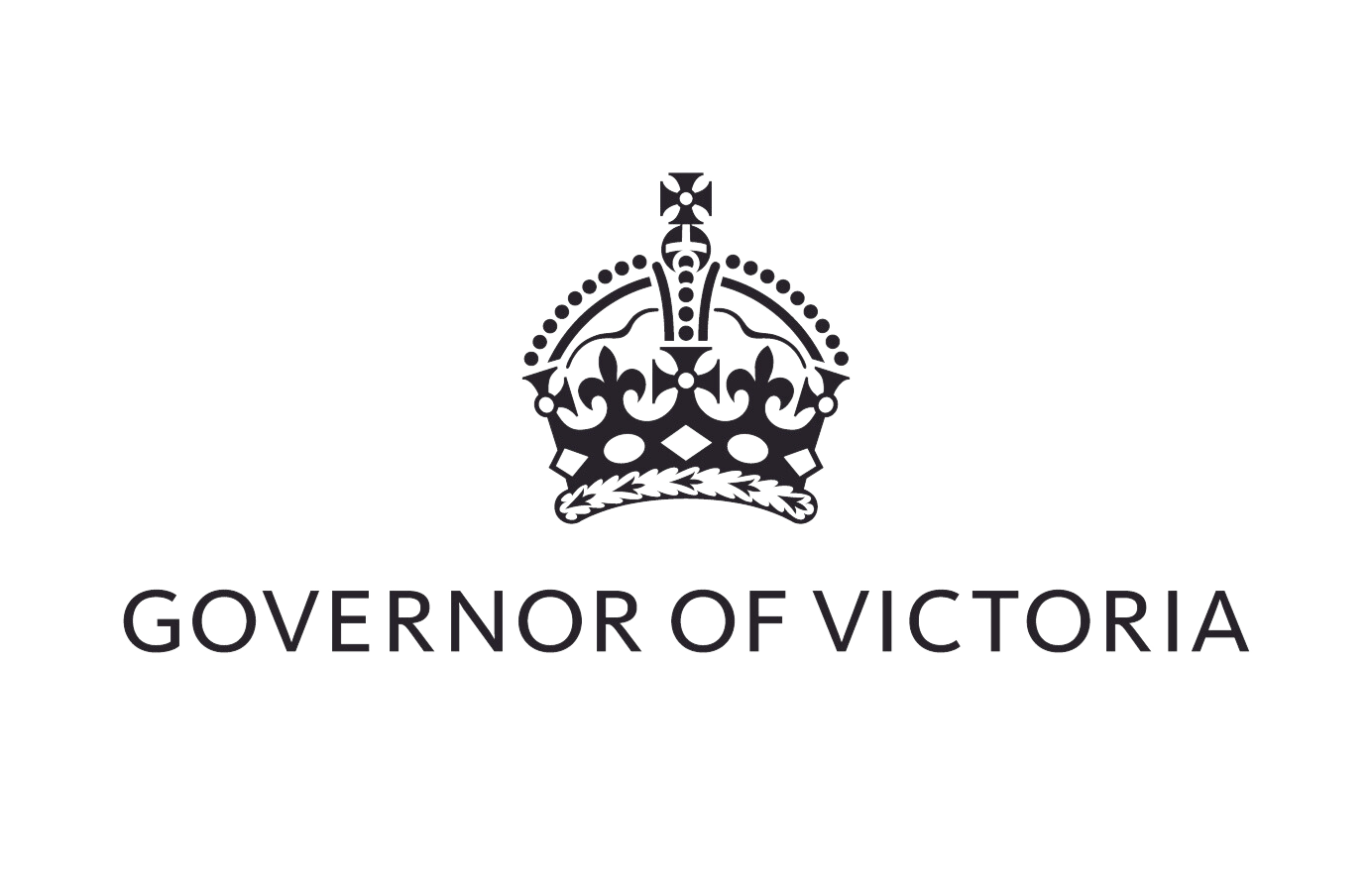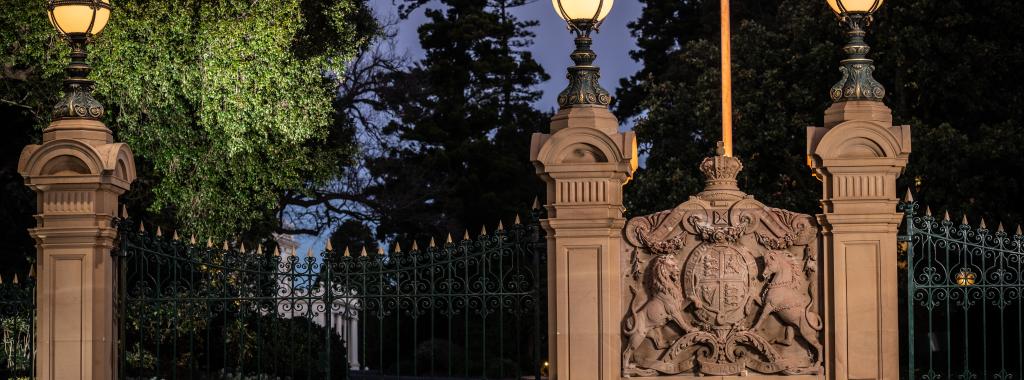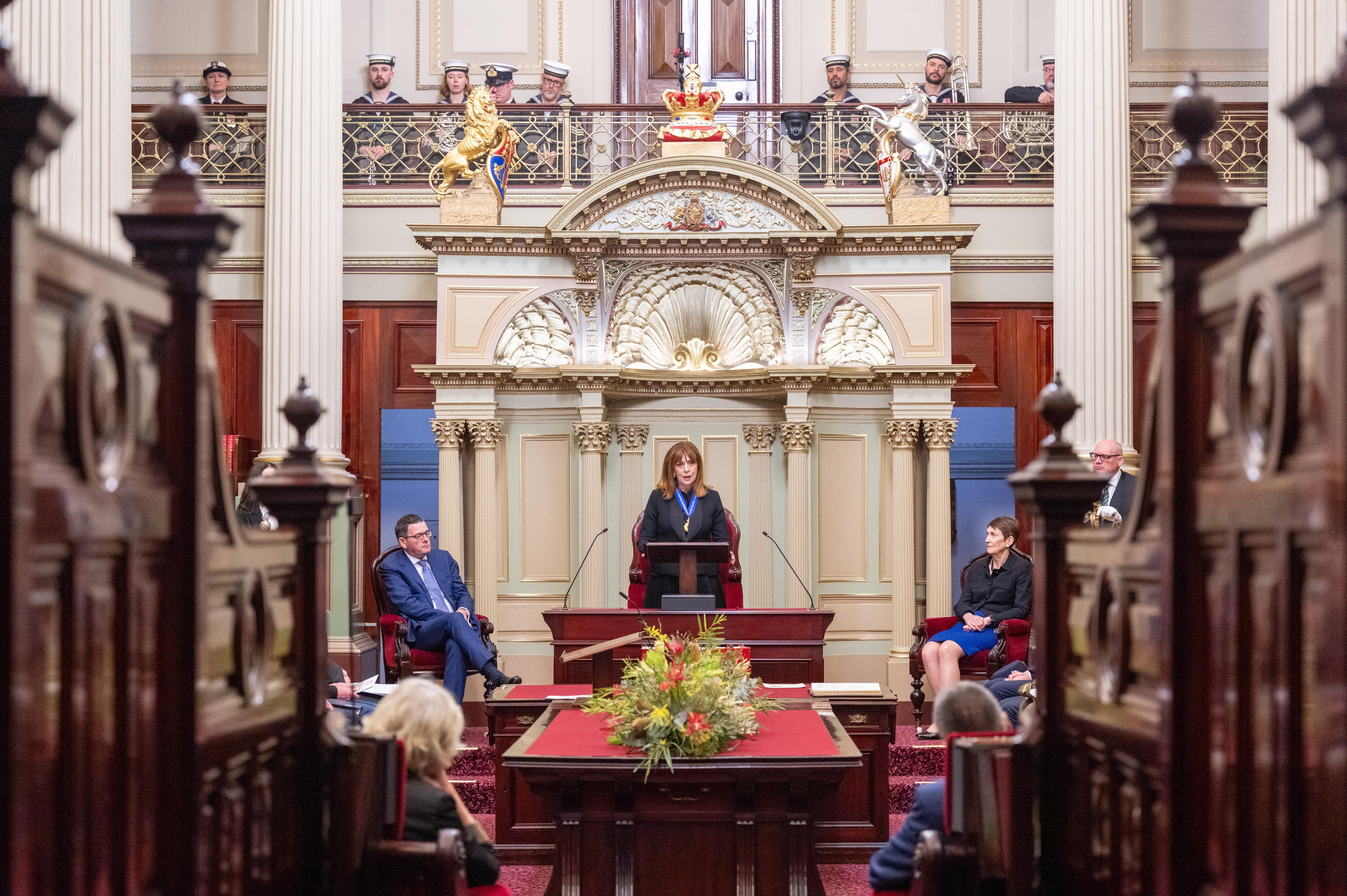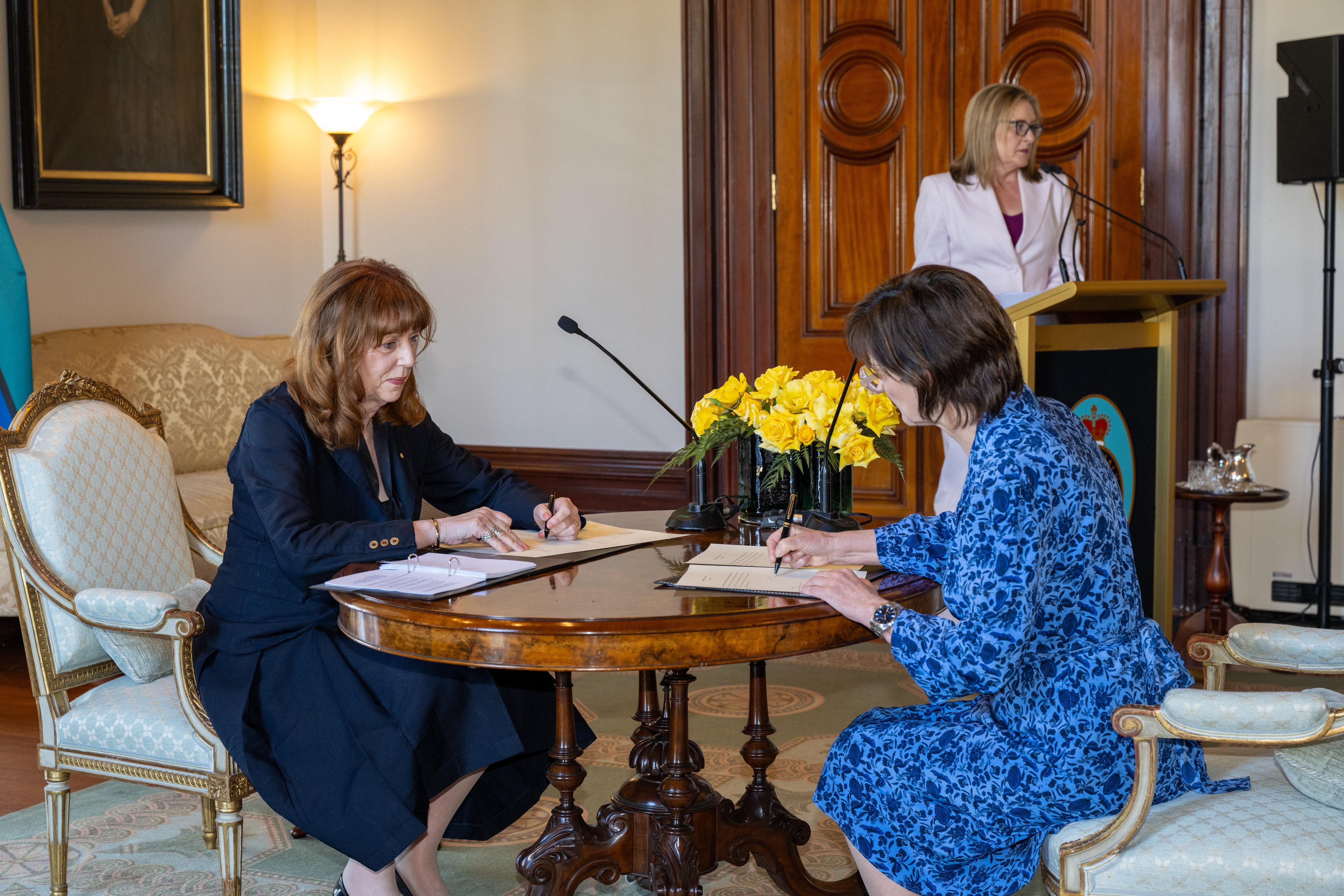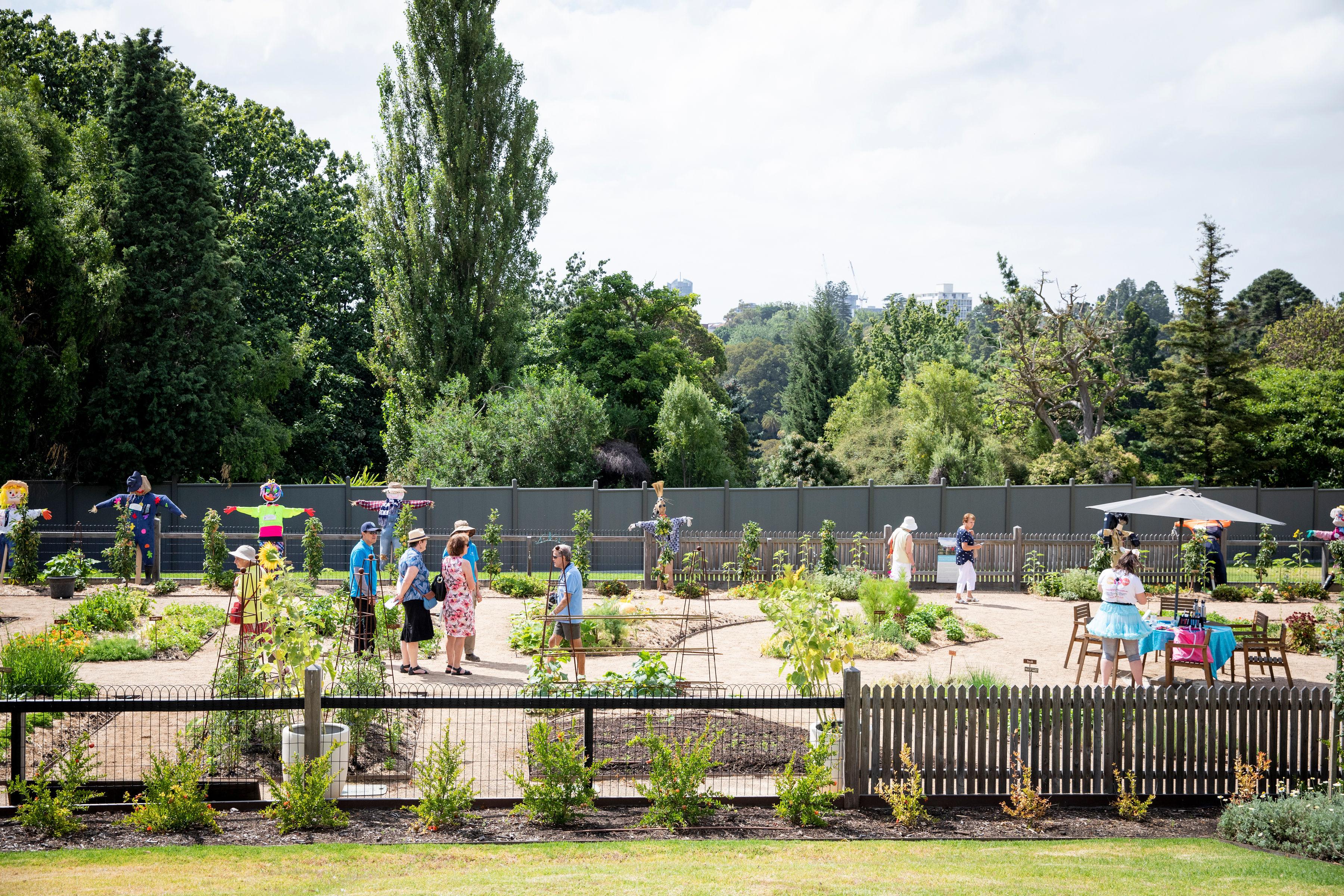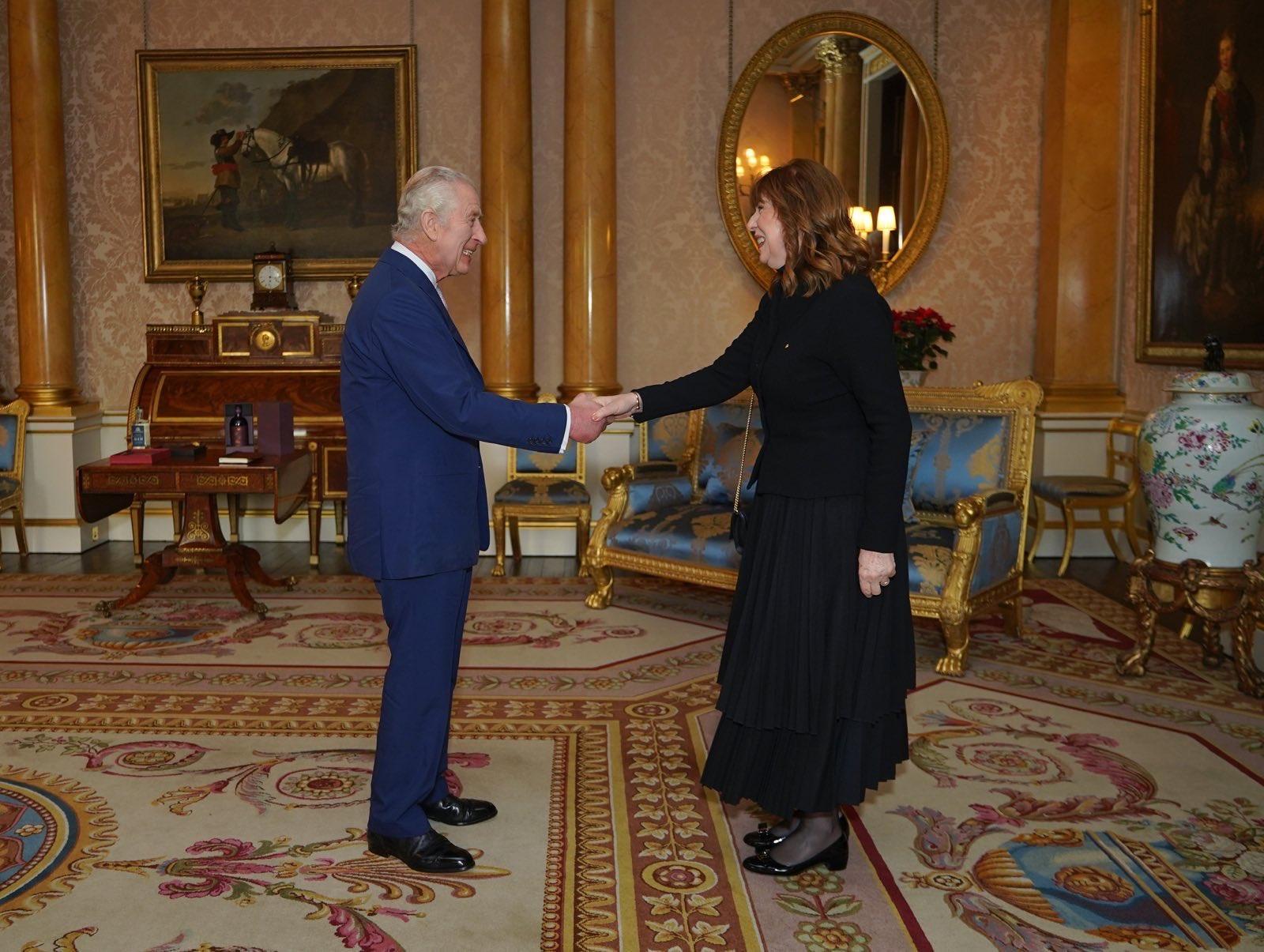The Governor as Head of State
Although the Governor is appointed by The King as his representative, the Governor exercises the constitutional power of Head of State in Victoria. The Australia Acts 1986 (passed concurrently by the Parliaments of the Commonwealth, the States and the United Kingdom) confirm that the State powers conferred on The King are to be exercised by the Governor and not The King. Thus, the Governor is not subject to the direction, supervision or veto of the Monarch.
There are two exceptions to the extent of the Governor’s powers. They are:
- the power of The King to appoint or dismiss the Governor
- when The King is present in Victoria, there are some powers His Majesty can exercise on the advice of the Premier, such as the ceremonial opening of Parliament or giving Royal Assent.
Appointment of the Governor
In Victoria – as is the case in the other States (and at the Commonwealth level in relation to the Governor-General) – The King appoints the Governor on the advice of the Premier. By convention, The King acts in accordance with such advice.
The Governor is appointed at The King’s pleasure, meaning that, on the advice of the Premier, The King can shorten a Governor’s appointment. Governors of Victoria typically serve terms of five years, although this period is sometimes shortened or extended by agreement between the Governor and the Premier.
Dismissing a Governor
The Premier can advise The King to remove a Governor from office. This has never happened in Victoria. A mid-term dismissal would likely face close scrutiny by the Parliament, the media and the community and, as such, would be a decision only taken in extreme circumstances.
The Lieutenant-Governor
The Lieutenant-Governor is appointed by the Governor on the advice of the Premier. The Lieutenant-Governor acts as the Governor’s deputy, usually when the Governor is out of the State. In those circumstances, the Lieutenant-Governor deputises for the Governor in relation to limited functions.
Role of the Governor
The responsibilities of the Governor fall into four broad categories:
- Constitutional responsibilities
- Community engagement
- Ceremonial duties
- International engagement
The Governor is supported in the discharge of their responsibilities by the Office of the Governor, an entity of the Victorian Public Service established under the Public Administration Act 2004.
Constitutional responsibilities
Primary responsibility
The primary obligation of the Governor is to oversee the workings of the government of the day to ensure that it acts within the boundaries of the Victorian Constitution and the rule of law. Thus the Governor is, in effect, a steward of our democratic framework and has certain powers and rights which may be exercised to achieve this. These powers and rights are described later.
Given the Governor’s place as the head of Victoria’s constitutional structure, it is important that the Governor remains apolitical and impartial. It is for this reason the Governor does not vote in elections.
The main constitutional responsibilities of the Governor in relation to the function of the government of the day are to:
- call an election
- chair the Executive Council
- give Royal Assent to Bills passed by both Houses of Parliament
- dissolve the Legislative Assembly in exceptional circumstances
- appoint and dismiss Ministers.
Calling an election
In 2003, the Victorian Constitution was amended such that Members of both Houses of Parliament serve four-year terms and elections occur on the last Saturday in November of the fourth year. On the day on which the Legislative Assembly expires, the Governor must issue writs for elections to the Legislative Assembly and the Legislative Council.
Executive Council
The ‘Governor in Council’ refers to the Governor acting on the advice of the Executive Council.
The role of the Executive Council is dealt with in Part IV of the Constitution Act 1975 (Vic).
In any matter that comes to the Governor in Council, the Governor has the right to be consulted by their Ministers, to encourage them and to warn them. However, the Governor is bound to act in accordance with the advice of either Cabinet or the Minister responsible for administering the statutory provision that confers the power.
The Governor in Council is not a deliberative body but one that acts on the advice of the relevant Ministers. It follows therefore that the relevant Minister will be accountable to Parliament for any decision that is made.
It is clear from this constitutional structure that the role of the Governor is not as a decision maker in the sense that the Governor does not formulate or decide upon Government policy. That role rests with the Executive Government, the members of which are accountable to the Parliament.
Giving Royal Assent
A Bill is a proposed Act that has not yet been passed by the two Houses of Parliament or has been passed but has not yet received Royal Assent. Once a proposed piece of legislation is passed by the two Houses and is given formal approval by the Governor – that is, given Royal Assent – it becomes an Act of Parliament and becomes the law of Victoria.
Dissolving the Legislative Assembly
The terms of the Legislative Assembly and Legislative Council normally expire automatically after four years. The Governor’s reserve power to dissolve the Legislative Assembly within that period can only be exercised in the following exceptional circumstances:
- when the Legislative Assembly passes a motion of ‘No Confidence’ in the Premier and Ministers, or
- when the Premier has advised the Governor that the dispute resolution process provided for in the Constitution has failed to resolve a deadlock between the two Houses of Parliament on a particular Bill.
Appointing and dismissing Ministers
After an election, the Governor appoints a new government by swearing in the new Premier and Ministers. In this way, the Governor plays a central role in our democratic system by ensuring the orderly transition of power from one ministry to the next.
If the government loses an election, the conventions inherited from the Westminster system see the existing Premier and Ministers continue on a caretaker basis until a new government is appointed, thereby ensuring Victoria is never without a government.
Convention also requires a defeated Premier to advise the Governor to call on the Leader of the Opposition to form a government and then to tender their own resignation and that of the defeated Ministers. Ordinarily, the Governor accepts the resignations and appoints a new government at the same time.
Before such an appointment is made, however, the Leader of the Opposition (the Premier-elect) must assure the Governor that he or she has the confidence of a majority in the Legislative Assembly. Upon being so satisfied the Governor commissions the Premier-elect to form a government. The new Premier and the Members of Parliament nominated by him or her are then sworn in as Premier and Ministers.
The Governor’s rights
Under our system of constitutional traditions it is generally accepted that the Governor has three essential rights in relation to the Government: the right to be consulted, the right to encourage and the right to warn. These rights are closely related and are important rights regarding the advice given by Ministers.
In the rare case where the consultation process is exhausted and the Governor continues to have concerns about a proposed action of a Minister, the Governor may formally warn him or her. It is probably this right that reflects the main influence the Governor may have in the constitutional process.
The Governor also has the right to warn the Premier (or Minister) of the consequences of a proposed course. This might include a warning of the possibility of the exercise of reserve powers. Such a right would be exercised only in exceptional circumstances.
It is important to bear in mind that the Governor is not concerned with the wisdom of a proposal or issues of politics or public policy. These are matters for the elected government. Similarly, it is for the courts to determine the validity or otherwise of an exercise of power. The Governor’s concern is to be satisfied that the proposal falls within the Constitution and accords with the rule of law and the practices and conventions of good government.
Reserve powers
The Governor has reserve powers that can be exercised notwithstanding the absence of, or despite, Ministerial advice. The reserve powers are very limited in nature and exist to ensure that Victoria’s system of government operates within the accepted democratic and constitutional framework. They can, however, only be exercised in very exceptional circumstances.
In general terms, a Governor should not exercise a reserve power without giving the Premier adequate warning that it may be exercised. This would give the Premier an opportunity to take steps to avoid the need for it to be exercised.
Community engagement
As a leader with no political association, the Governor is seen as a symbol of unity who seeks to represent and understand the whole Victorian community and who encourages unity, mutual respect and confidence among its members.
One of the Governor’s principal tasks is to promote in Victoria the attitudes that support democracy and create a strong community. The Governor encourages people in voluntary service, innovation, education, artistic endeavours and sporting achievement, just to name a few. They are patrons of many not-for-profit organisations, which they support in a variety of ways.
Community engagement by the Governor takes many forms.
They include:
- holding receptions, where contributions to the Victorian community by individuals or organisations are recognised
- interacting with non-profit organisations
- visiting schools and speaking with students and staff
- holding discussions with community leaders
- opening new facilities that benefit the public
- supporting a range of cultural activities
- speaking on behalf of, or for, the community at events that concern all Victorians, such as ANZAC Day, Australia Day, and on civic occasions of shared grief and mourning.
The Governor’s community engagement includes the extensive use of Government House for the benefit of the community.
This includes:
- opening the house on Australia Day and on other occasions to thousands of visitors
- offering tours of Government House to school groups and others
- fostering community partnerships around the Kitchen Garden
- hosting occasions in the historic gardens of Government House.
Ceremonial duties
The ceremonial duties of the Governor include events such as:
- the Opening of Parliament
- attending the Dawn Service and march past on ANZAC Day
- swearing in Ministers and Supreme Court judges
- presiding at investitures for the Order of Australia and other awards
- fulfilling the ceremonial role of ‘University Visitor’ of each Victorian university.
International engagement
The Governor has an important role in promoting Victoria’s international economic, social and cultural interests, both at home and abroad.
In Victoria, the Governor develops strong relationships with ambassadors and high commissioners, and with the Consular Corps in Melbourne. The Governor also receives visiting heads of state, heads of government and other senior international representatives, often extending an invitation to stay at Government House.
Further, the Governor actively engages with Victoria’s international community, for example, through hosting overseas students at Government House, through visiting the Victorian operations of international companies, and through hosting receptions for delegates to major international conferences being held in Victoria.
As part of the Governor’s duties and at the request of the Premier, the Governor travels overseas on behalf of Victoria as Head of State. Just as at home, on these occasions the Governor’s role is to build friendship and good relations with other nations and to promote Victoria’s economic, social and cultural interests.
Such visits open up opportunities of benefit to Victoria between various international entities and their Victorian counterparts.
